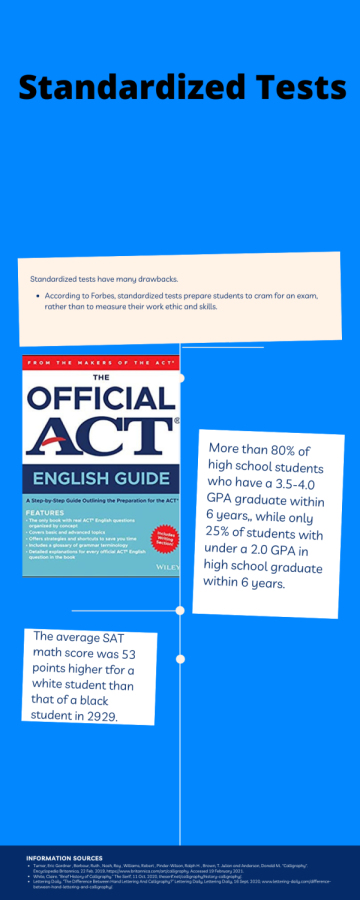Test optional for good
ACT and SAT scores should not be a factor in admissions
Infographic by Camille O’Neill
Standardized test scores should not be required for admission because they don’t showcase skills needed for college.
February 1, 2022
Studies show that there is no correlation between ACT scores and college graduation; however, there is correlation for SAT scores.
Many colleges are finding that standardized test scores are not an accurate reflection of a students’ performance in college. Millard needs to follow suit and drop their ACT requirement for high school graduation so students won’t have to be forced to sit through a four hour test.
According to a study done by Forbes, a student who has a high GPA and a low SAT score has a 62% chance of graduating within six years, while a student with a low GPA and a high SAT has a 51% chance. This is not a significant enough difference to prove that ACT/SAT scores lead to higher graduation rates.
Classes in high school provide students with the essential tools to be successful in college, such as time management and turning in their work on time, while standardized tests require students to remember concepts from the past and add unnecessary pressure to students. While ACT tests prepare students for college in terms of having time limits on exams, these tests do not hone in on essential skills needed for college.
A New York Times article stated that more than 1,230 colleges have gone test-optional in the last decade with most of them being smaller institutions. According to a US News report, the number of schools that have gone test-optional since the pandemic has increased dramatically. Before the pandemic, there was one test-blind school in the nation. Now, there are 68 registered test-blind schools.
Going test-optional would allow more students to be admitted to colleges and pursue their future plans. ACT and SAT scores also shouldn’t be considered by colleges because not all students have the resources necessary to prepare for the tests so they can do their best. An article by The Washington Post says test scores are most often correlated with the students’ socioeconomic status rather than their skill level. At Millard West, we are lucky to be in a school district that pays for John Baylor ACT prep, but that is not the case in most districts around the country. To get John Baylor test prep without a district’s help, it costs over $900, and some families do not have the ability to pay for this. This shows that lower-income families do not have as much access to prep, and therefore, they get lower scores.
While some colleges argue that SAT and ACT scores allow for more diverse populations to be admitted, others have gotten rid of the system because they don’t think it’s fair for the students who don’t have the resources to prepare for the tests, and I personally agree. For students who don’t have as many resources to prepare, the test isn’t fair because they don’t know what kinds of questions to expect, and they wouldn’t know how to use their time wisely, resulting in lower scores. For people like me with disabilities, taking long tests wears on your brain, especially when someone is granted extra time, and is in the testing room longer than their peers. This stress should be eliminated, and students should no longer need to take a standardized test of all colleges go test-optional.
Students should be admitted to colleges based on the hard work they put in in high school and not based on one test. Many students also retake the SAT or ACT and get a different score on each test. Because of this, standardized tests are not an accurate measurement of students’ skills and understanding.
Colleges shouldn’t require standardized test scores because they don’t showcase skills that prepare students for college. GPA should be considered more because high school classes prepare students for college better. A study done by the Educational Researcher found that students who have a 3.5-4.0 GPA in high school have an 80% college graduation rate within six years, while students who have a 3.0-3.5 GPA have just over a 50% graduation rate.







